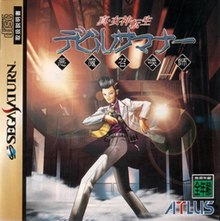| Shin Megami Tensei: Devil Summoner | |
|---|---|
 Sega Saturn cover art | |
| Developer(s) | Atlus |
| Publisher(s) | Atlus |
| Director(s) |
|
| Producer(s) | Katsura Hashino (PSP) |
| Designer(s) |
|
| Artist(s) | Kazuma Kaneko |
| Writer(s) | Ryutaro Ito |
| Composer(s) |
|
| Series | |
| Platform(s) | |
| Release | |
| Genre(s) | Role-playing |
| Mode(s) | Single-player |
Shin Megami Tensei: Devil Summoner[a] is a role-playing video game developed and published by Atlus. Forming part of the Megami Tensei franchise, it is the first title in the Devil Summoner series. It was first released for the Sega Saturn in December 1995, and received a port to the PlayStation Portable in December 2005. Despite reports of it being planned for localization, neither version has been released outside Japan.
Set in the city of Hirasaki in modern-day Japan, the story follows a college student whose death at the hands of demons forces his soul into the body of Summoner Kyouji Kuzunoha. Now in Kuzunoha's body, the protagonist must investigate the appearance of demons in the town and the activities of Sid Davis, the Dark Summoner responsible for killing the protagonist and Kuzunoha. The gameplay carries over multiple classic elements from the Megami Tensei series, including first-person dungeon navigation, turn-based battles, and negotiation with demons to recruit them into the player's party.
Devil Summoner began development after the positive reception of Shin Megami Tensei If.... Designed from the outset as a spin-off from the main Megami Tensei series, it drew on elements of detective fiction. It was also the series' first appearance on fifth-generation home consoles. Regular Megami Tensei staff were involved with the project, including director Kouji Okada, writer Ryutaro Ito, and character designer Kazuma Kaneko. The music was composed by Toshiko Tasaki and Tsukasa Masuko. Upon its release in Japan, the original version garnered positive reviews from Japanese press and strong sales. It went on to spawn both a television series and multiple sequels.
Cite error: There are <ref group=lower-alpha> tags or {{efn}} templates on this page, but the references will not show without a {{reflist|group=lower-alpha}} template or {{notelist}} template (see the help page).